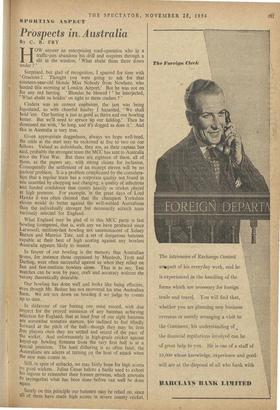Prospects in. Australi a
. •
By C. B. FRY HOW answer an enterprising road-operative who in a traffic-jam abandons his drill and enquires through a slit in the window, ' What abaht them there down under ? '
Surprised, but glad of recognition, I sparred for time with ' Gracious I Thought- you were going to ask for that nineteen-year-old blonde Miss Nobody from Nowhere, who landed this morning at London Airport.' But he was not on for any red herring. ' Blondes be blowed I ' he interjected, ' What abaht us holdin' on tight to them cinders ? '
Cinders was an earnest euphuism, the jam was being liquidated, so with cheerful finality I hazarded, ' We shall hold 'em. Our batting is just as good as theirs and our bowling better. But we'll need to spruce up our fielding.' . Then he dismissed me with, ' So long, and it's dogged as does it.' And this in Australia is very true.
Given appropriate doggedness, always we hope well-bred, the odds at the start may be reckoned at five to two on our fellows. Valued as individuals, they are, as their captain has said, probably the strongest team the MCC has sent to Australia since the First War. But there are eighteen of them, all of them, as the papers say, with strong claims for inclusion. Consequently the settlement of an excerpt eleven will be no parlour problem. It is a problem complicated by the considera- tion that a regular team has a corporate quality not found in one unsettled by chopping and changing; a quality of infectious and funded confidence that counts heavily in cricket played at high pressure. For example, in the great days of Lord Hawke it was often claimed that • the champion Yorkshire eleven would do better against the well-welded Australians than the individually stronger but necessarily scratch team variously selected for England.
What England may be glad of in this MCC party is fast bowling (compared, that is, with any we have produced since Larwood), medium-fast bowling not unreminiscent of Sidney Barnes and Maurice Tate, and a set of dangerous batsmen capable at their best of high scoring against any bowlers Australia appears likely to muster.
In favour of our bowling is the memory that Australian teams, for instance those .captained by Murdoch, Trott and Darling, were often successful against us when they relied on fast and fast-medium bowlers alone. That is to say, Test matches can be won by pace, craft and accuracy without the variety theoretically desirable.
Our bowling has done well and looks like being effective, even though Mr. Bedser has not recovered his true Australian form. We are not down on bowling if we judge by events up to date.
In disfavour of our batting one must record, with due respect for the pi-Ted eminence of any batsman achieving selection for England, that at least four of our eight batsmen are somewhat tentative starters, too inclined to feel blindly forward at the pitch of the ball—though they may be firm free players once they are settled and seized of the pace of the wicket. And unfortunately in high-grade cricket against keyed-up bowling firmness from the very first ball is at a special premium. The least dithering is so often fatal; the Australians are adepts at turning on the heat of attack when the new man comes in. .
Still, in spite of setbacks, we may fairly hope for high scores on good wickets. Julius Cxsar before a battle used to exhort his legions to remember their former prowess, which amounts to sayingothat what has been done before can well be done again. True, our professed batsmen have not all made the scor they are worth. But proved batsmen, year in, year out, generally end up with about the same aggregates and averages; so it is probable that our batsmen who early on are down on their runs will later on, i.e. in Test matches, come into their own with good scores; it is a fair probability.
Our tail-enders have not done much. This is a prospective weakness because it is the tail-ender who can help the successful protagonist to put on 50 to 70 runs.
It is assumed that we are much troubled to nominate an opening partner for Mr. Hutton. But this is an exaggerated trouble. If a man can bat well down the list he can bat well at number one or two. A settled order is an advantage; it is not a decisive factor. Place on the list does not determine individual prowess.
As for fielding, we know that there Australia is strong and that we shall be put to it to rival her excellence. But we may be lucky and hold all our catches. Who knows ?
In this connection one is reminded that Alfred Spender, the distinguished editor or the old Westminster Gazette, caused to be printed in big type and displayed in his sports department an admonition that failure to score or to catch catches must not be imputed to cricketers as evidence of moral obliquity.
The accomplished authors and their able assistants writing about the cricket in Australia are in no need of such advice nor unfortunately has one any editorial authority. There is, however, one remark they would do well to bear in mind. It is that in writing about any field game there is always a strong tendency to concentrate on the excellencies of the winner and on the vices of the loser. This is natural enough becayse both success and failure have to be explained; but the tendency often leads to unbalanced criticism and even to pronounced injustice.
The reader, however, in search of just criticism will no doubt remember that how an onlooker interprets what he sees depends upon his own mental context for incorporating the signs to be interpreted. Consequently the commentator in the Press box whose actual first-hand experience of big cricket is considerable is likely to be much nearer the mark than the one whose experience is precisely nil—the more so because the Press box is usually about a hundred yards away from the pitch and the commentator has to interpret small signs a long way off. Moreover he is usually writing in a hurry and on the spur of the moment.
Hence the reader, however grateful for information from the man on the spot, may well be on his guard, accepting any excess either of praise or of blame proverbially turn grano. Further, he will probably discover for himself that neither eulogistic epithets nor damnatory phrases really tell the true story in the elusive matter of physical skill.
Accurate details of fact are not only more pictorial but far more explanatory. Even so, a genuinely apt adjective can perform the function of a whole sentence, in which case it is just what an adjective should be. Has not the poet written with true poetic insight: Fine .off-drives sound well,
Turf-singers ring the bell.











































 Previous page
Previous page